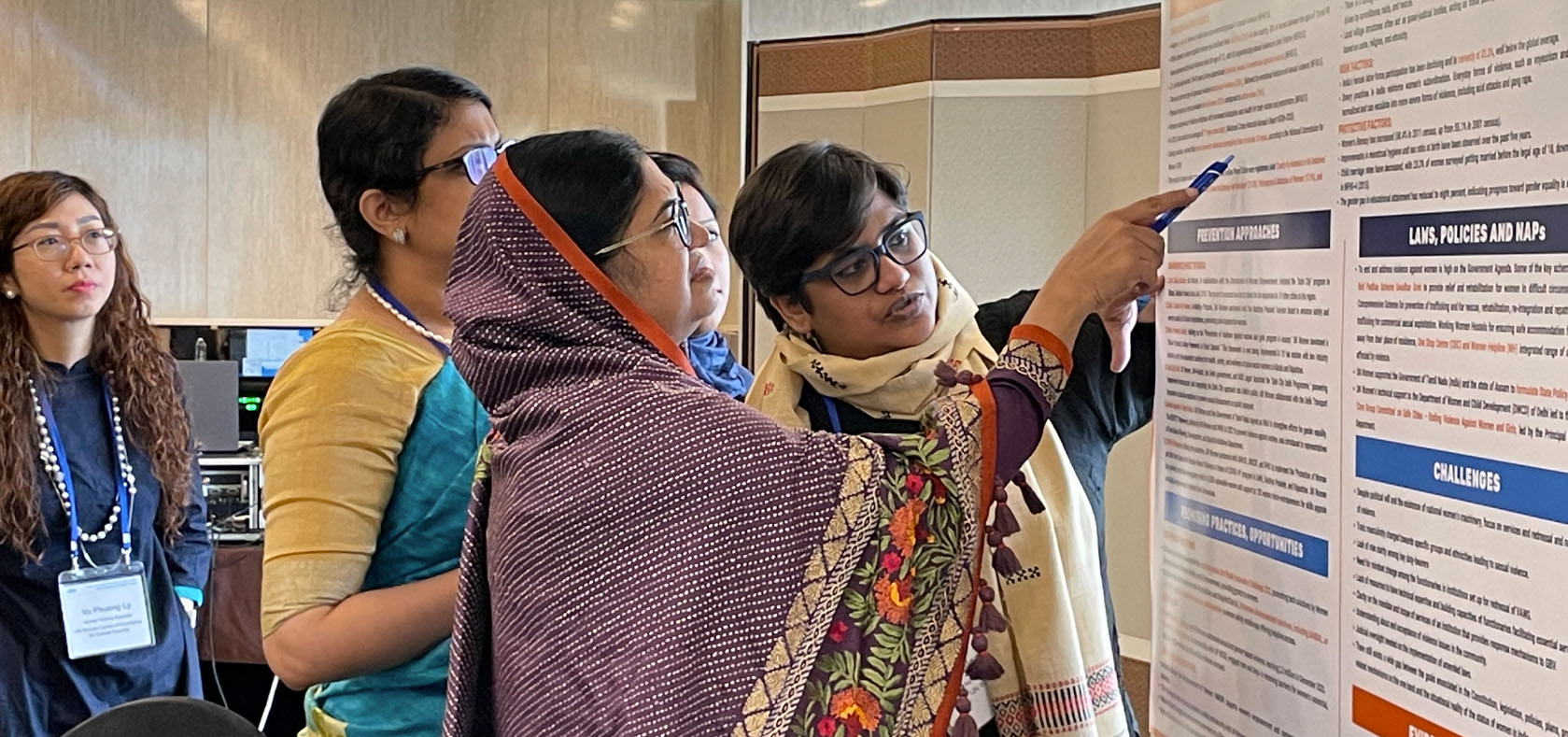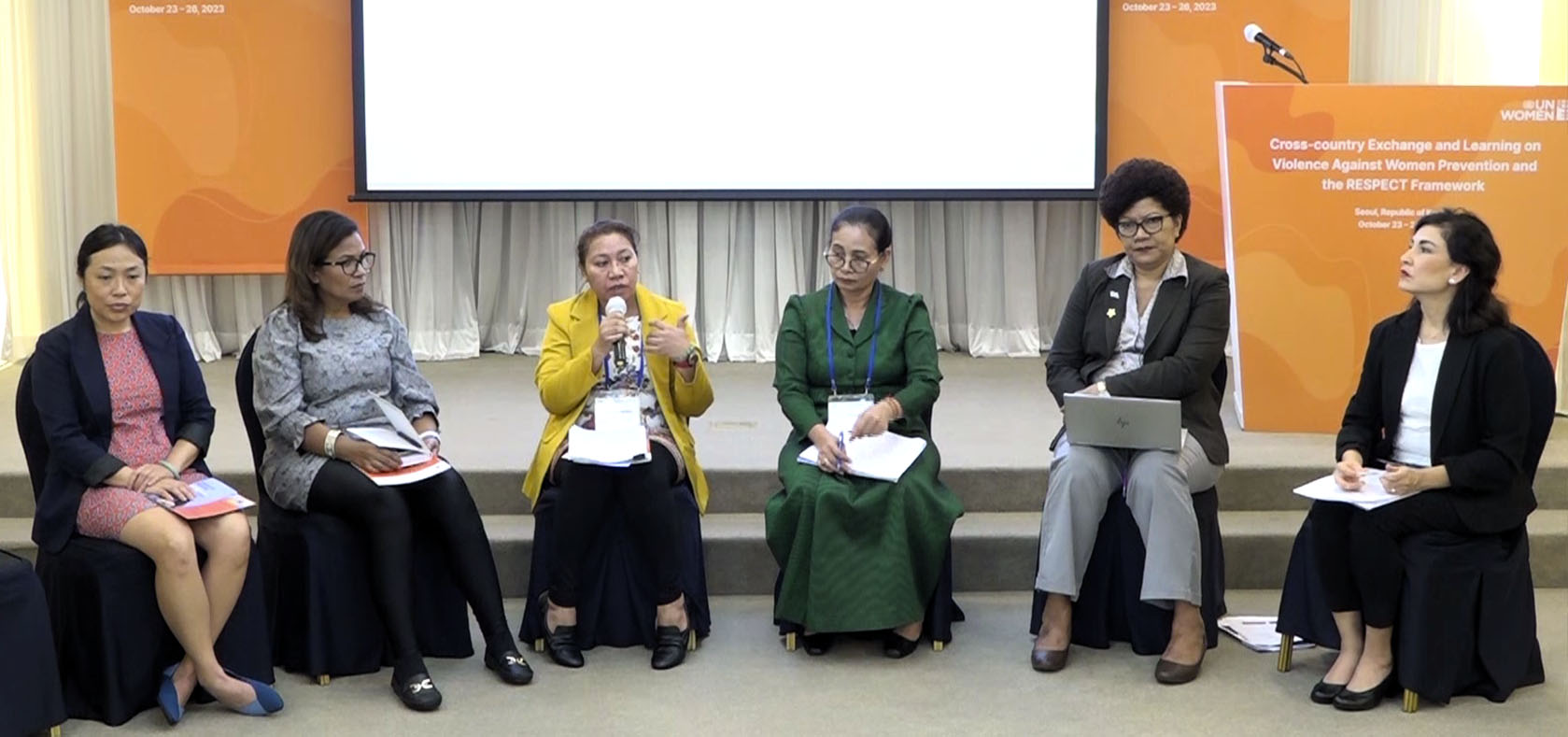English | 한국어
Seoul, Republic of Korea — Getting all groups in society involved from the start is crucial to success of efforts to stem violence against women, officials from Asia-Pacific countries said at a training organized by UN Women.
A total of 48 government representatives and experts from 10 countries in Asia and the Pacific gathered in Seoul from 23 to 26 October 2023 to share experiences on preventing violence against women. UN Women Centre of Excellence for Gender Equality and UN Women Regional Office for Asia and the Pacific co-hosted the workshop.
“Violence against women is still one of the most prevalent forms of violence in the world we live in. Preventing [it] involves addressing the structural gender inequalities and discriminations deeply rooted in societies, as it is crucial to prevent such incidents from occurring in the first place,” Jeongshim Lee, Director of UN Women Centre of Excellence for Gender Equality, said at the workshop.
UN Women experts introduced at the workshop seven strategies from the publication RESPECT Women: Preventing violence against women, an evidence-based framework UN Women developed with World Health Organization. Using the RESPECT prevention programme brief developed by UN Women, the experts guided the participants to develop prevention programmes and monitoring and evaluation frameworks for the programmes.

Participants at the UN Women-organized training on 23 October 2023 in Seoul discuss a country poster showing measures to prevent violence against women. Photo: UN Women/Seoyeong Bak
Melissa Alvarado, Ending Violence against Women Programme Manager of UN Women Regional Office for Asia and the Pacific, said: “While we aim to see reductions in the prevalence rates of violence against women, these rates change relatively slowly, and it is important to track short-term signals of progress toward these longer-term changes at population level.”
The workshop participants discussed the importance of collecting data and evidence, as well as measuring the effectiveness of violence prevention programmes – particularly how they can change social norms on gender equality.
The participants discussed the specific risk factors for the types of violence in their own countries. Then they designed interventions based on the strategies in the RESPECT framework.
“Creating a common understanding of what drives violence against women takes a long time but it is crucial to raising public awareness of prevention measures,” said Loksee Leung, Senior Manager, Research and Evaluation at The Equality Institute, Australia.
Workshop participants from countries including Australia, Fiji, Cambodia and Timor-Leste spoke of how they have strengthened their legal frameworks on prevention by adopting national action plans to prevent violence against women and how they developed, implemented and monitored these plans. Also, workshop participants discussed the Together for Prevention Handbook, a guide on adopting national action plans that was developed by UN Women and The Equality Institute.

Representatives of Australia, Timor Leste, Cambodia and Fiji share their experience and lessons learned of developing National Action Plans on the Prevention of Violence Against Women and Girls. Photo: UN Women/Kwanju Kim
The participants stressed the importance of coordination among all groups involved in the anti-violence effort, including government agencies, development partners, international non-governmental organizations and civil society organizations. They said that actively engaging all groups in the consultation process, including civil society organizations and women’s and men’s groups in the communities, was key to the success of national action plans.
Eseta Nadakuitavuki, Permanent Secretary from the Ministry of Women, Children and Social Protection of Fiji, highlighted the importance of “genuine partnerships” that ensure that all stakeholders are engaged from the very beginning until the launch of a national action plan. Basing conversations on evidence and facts and respecting the expertise of local partners can lead to a stronger buy-in from stakeholders, she said.
Keth Saroth, Acting Director of Legal Protection Department, Ministry of Women's Affairs of Cambodia, said strong political will from high-level leaders was key in bringing together different line ministries and ensuring coordination among them.

